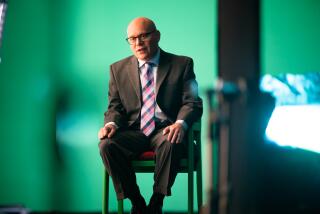TV REVIEW : ‘America and the Holocaust’ Shatters Myth : The 90-minute ‘American Experience’ documents the Roosevelt Administration’s deceit and indifference toward wartime plight of European Jews.
The American self-image of ethical uprightness in the face of Nazi terror during World War II has remained an unexamined myth of the national life. But the myth is broken, if not shattered, by Martin Ostrow’s devastating 90-minute film for PBS’ “The American Experience,” “America and the Holocaust: Deceit and Indifference.” With a mass of paperwork and eyewitness testimony to back it up, Ostrow’s work explains how the U.S. government deliberately prevented the immigration of millions of Jews trying to flee Nazi-occupied Europe. And the blame falls right into the lap of President Franklin D. Roosevelt.
Yet Ostrow’s superbly constructed history, lucidly narrated by Hal Linden and based largely on scholar David S. Wyman’s decades-long research, is not merely a critique of U.S. war-era policy. It reveals an America shot through with deep anti-Semitic sentiments, and recounts the tragic tale of Jewish refugee Kurt Klein’s family. As Klein’s running narrative is intercut with the political scandal in the halls of Washington, “America and the Holocaust” sharply demonstrates how bureaucratic decisions carry personal and moral consequences.
Unlike the racist virulence of the Nazis, a quieter racism dominated such agencies as the State Department, according to Wyman, who points a particular finger at Assistant Secretary of State Breckinridge Long. Roosevelt appointee Long enacted a secret policy to, in Long’s words, “postpone and postpone and postpone” visas for Jews seeking refuge in the United States. The motives of Long and his cronies could do with more examination by both Ostrow and Wyman; alongside anti-Semitism were the political pressures of hundreds of anti-foreign, anti-immigrant “patriotic societies,” isolationism, the security concern that German spies would enter the United States and the State Department’s concern not to upset relations with oil-rich Arab nations.
*
Klein recalls the unendurable wait as he and his brothers and sisters, freshly arrived in the new country, anticipated word from their parents that their visas were in order for emigration. To his growing horror, he realized that German extermination plans were being aided and abetted by both British and American policymakers unwilling to ease visa requirements.
The young Klein was David against the U.S. governmental Goliath, but, as news arrived in 1942 that German trains were carrying thousands of Jews to death camps, a campaign for American rescue of Jews gained real clout. Its stars included such unlikely allies as Rep. Will Rogers Jr., writer Ben Hecht and Dr. Stephen S. Wise, but it was Treasury Secretary Henry Morgenthau and his aides who finally uncovered Long’s secret policy.
The horrors didn’t end there. Ostrow’s film describes how the War Department declined to consider bombing the Auschwitz death camp because it was too far a flight, even though several photos show U.S. bombers flying directly over the camp to bomb nearby oil factories. Klein’s story finally ends with a mixture of bittersweetness and tragedy that ranks with the most moving chapters in Holocaust history.
More to Read
The complete guide to home viewing
Get Screen Gab for everything about the TV shows and streaming movies everyone’s talking about.
You may occasionally receive promotional content from the Los Angeles Times.






